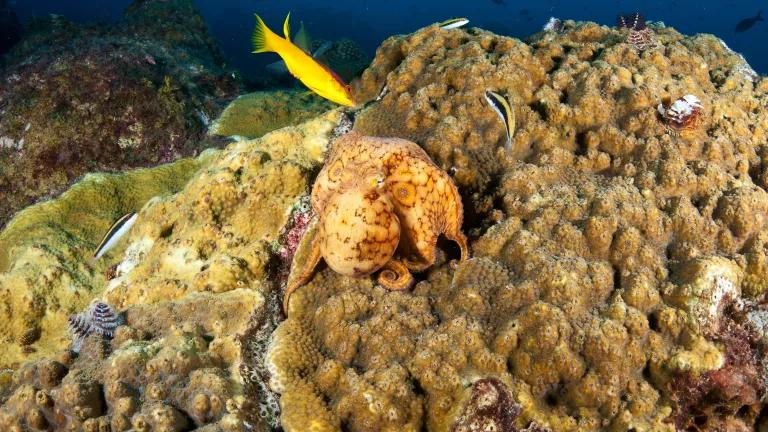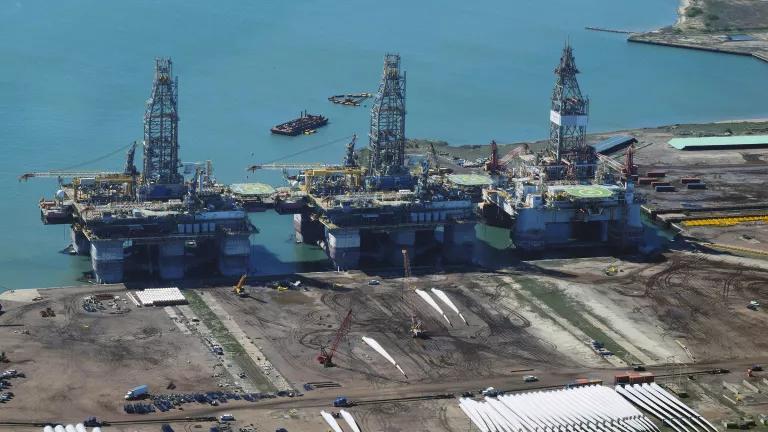Holding BOEM Accountable for Offshore Leasing Reform
New offshore leasing proposed by BOEM would cause unacceptable harm to our climate, ocean, and Gulf communities. But agency reforms can help lessen the impacts.

A Caribbean two-spotted octopus in the coral of Flower Garden Banks National Marine Sanctuary. NOAA.
The Bureau of Ocean Energy Management (BOEM) has begun planning a new round of offshore oil and gas lease sales. This week, NRDC, Earthjustice, and a coalition of community and environmental groups submitted comments calling for BOEM to fully analyze the climate, environmental justice, and ecological impacts of leasing, and—if the agency decides to hold any lease sales— protect environmentally sensitive areas and establish strong lease stipulations.
BOEM recently published a five-year offshore leasing program, which scheduled three oil and gas lease sales between 2025 and 2029. While this is the fewest number of lease sales ever included in a five-year program, these sales would still potentially open tens of millions of acres in the Gulf of Mexico to fossil fuel drilling, with devastating consequences for our climate, frontline communities, and the environment. Moreover, the United States doesn’t need new offshore leasing to meet our energy needs, and we can’t afford to increase fossil fuel production, given the global climate crisis.
BOEM has full discretion to cancel or delay any of the lease sales scheduled in the five-year program. Unfortunately, however, the Inflation Reduction Act prevents BOEM from issuing leases for offshore wind energy unless the agency has held an offshore oil and gas lease sale in the preceding year.
If BOEM decides to hold offshore oil and gas lease sales because of the linkage to offshore wind leasing, the agency must protect important habitat and environmental features by disallowing leasing in critical areas of the Gulf. BOEM can and should also establish mandatory measures to prevent, minimize, and mitigate some of the worst environmental impacts of fossil fuel exploration and production.
Our comments urge BOEM to take the following actions:
Develop a carbon budget to reduce greenhouse gas emissions from leasing.
Fossil fuels are the primary driver of the climate crisis. At a time when the United States needs to reduce greenhouse gas emissions, selling more offshore leases to the oil and gas industry will only worsen climate change. Our comments therefore call for BOEM to develop a carbon budget to limit greenhouse gas emissions from new offshore oil and gas leases. Under a carbon budget, BOEM would set a cap on the amount of carbon emissions from new leasing based on national climate goals. When conducting a lease sale, BOEM would issue only as many leases as fit within the carbon budget.
Enhance protections for the critically endangered Rice’s whale.
Rice’s whale, also known as the Gulf of Mexico whale, is one of the most endangered marine mammal species on the planet, with only about 50 individuals left. Rice’s whale lives exclusively in the Gulf of Mexico; in fact, it’s the only baleen whale whose known range is limited to waters off the United States. Yet oil and gas exploration and development threaten the very survival of this iconic species. The 2010 Deepwater Horizon oil spill killed an estimated 17% of the Rice’s whale population. Future oil spills are an ever-growing threat, as companies increasingly drill in deeper, riskier waters. Vessel strikes can kill or injure Rice’s whales, and noise from seismic surveys and increased vessel traffic disrupts behaviors critical to its survival, like communication, feeding, and reproduction.
Our comments call for BOEM to exclude Rice’s whale habitat, which extends across the Gulf in waters between 100 and 400 meters deep, from any new leasing. In addition, a buffer zone of at least 10 kilometers around this habitat should be excluded from leasing to account for the whale’s movements. We also urge BOEM to adopt lease stipulations—that is, binding conditions that lessees must follow— to protect the Rice’s whale. As one such stipulation, the agency should establish a 10-knot speed limit in the whale’s habitat to prevent potentially fatal collisions and require vessel-quieting measures and use of noise-reduction technology for seismic surveys.
Prevent new leasing in vital coral habitat and the Flower Garden Banks National Marine Sanctuary.
Along the continental shelf break in the Gulf, unique topographic features of the seafloor—such as small underwater hills, rocky reefs, and pillar-shaped pinnacles—provide habitat for highly productive and biodiverse communities of corals, fish, and plants. These rich habitats also support commercial and recreational fisheries. Recognizing the need to protect the coral “gardens” supported by seabed banks, NOAA established the Flower Garden Banks National Marine Sanctuary in 1992 and expanded the sanctuary in 2021.
Oil and gas drilling and related activities, such as anchoring, pipeline construction, and discharge of drilling muds, heavy metals, and toxic compounds, can harm or destroy seafloor habitat and the fish that rely on it. Nevertheless, BOEM has generally allowed oil and gas leasing in topographic feature areas, including the expanded Flower Garden Banks National Marine Sanctuary. Our comments call for BOEM to protect irreplaceable habitat and biodiversity by excluding topographic feature areas and the full marine sanctuary from leasing.
Establish mitigation measures to protect environmental justice communities, address methane emissions and idle wells, and prevent another Deepwater Horizon.
BOEM has broad authority to establish lease stipulations to mitigate the adverse impacts of oil and gas activities. Our comments call for BOEM to co-develop mitigation measures with environmental justice communities in the Gulf, who are disproportionately exposed to pollution and toxic waste from the ports, petrochemical plants, and refineries built to transport and process fossil fuels produced offshore. The agency should also incentivize oil and gas companies to enter into community benefit agreements with frontline communities to address harms or offer benefits.
We also ask BOEM to develop lease stipulations to protect the marine environment by heightening safeguards against blowouts in order to prevent catastrophic oil spills and calling for the use of new technology to report methane emissions. Methane emissions far exceed levels previously included by BOEM in the national greenhouse gas inventory, according to a recent study. Methane is a potent climate pollutant, and accurate reporting is a critical first step to reducing emissions.
Finally, BOEM should stipulate that companies may not bid on new oil and gas leases until they have decommissioned infrastructure that they are no longer using. The oil and gas industry has left thousands of abandoned or improperly decommissioned wells in the Gulf, which can leak oil and methane. If companies do not fulfill their obligations, taxpayers will be on the hook for billions of dollars in decommissioning and clean-up costs.
BOEM does not have to expose our ocean to any more oil and gas leasing. But if the agency decides to lease, it must adopt measures to lessen impacts on the climate, Gulf communities, and the ocean environment.


